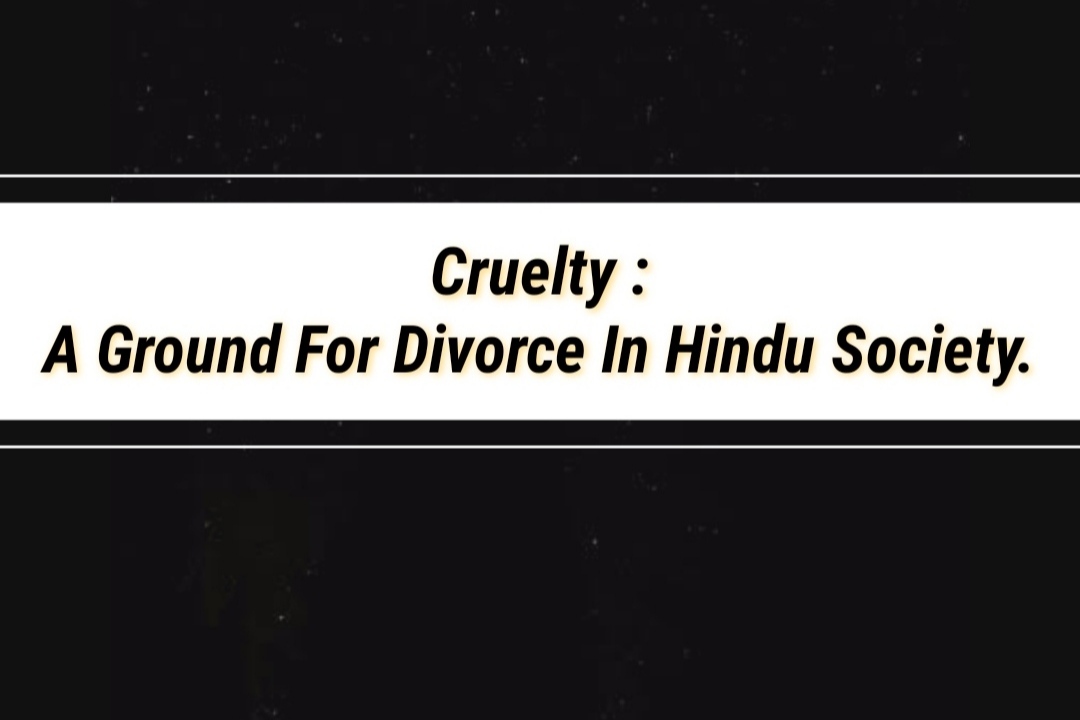Introduction
Marriage in Hindus is believed to be one of the necessary religious rites for all Hindus. According to the ancient texts, a man is incomplete without performing the religious rites of marriage. Marriage is considered a sacramental institution and an indissoluble union in Hindu society. The concept of divorce was introduced in the Hindu Marriage Act, 1955, and was available to all Hindus. Section 13 of the Hindu Marriage Act, 1955, brought a revolutionary and dynamic change in the marriage law of Hindus. Section 13 of the Hindu Marriage Act, 1955 was amended few times to meet the needs of society. There are in total fifteen grounds for divorce.
Originally, under the Hindu Marriage Act, 1955, cruelty was a ground only for judicial separation. In 1962, the act was amended by the legislature of Uttar Pradesh, and cruelty was included as a ground for divorce. Clause (i-a) was inserted under Section 13(1)(i), which said “has persistently or repeatedly treated the petitioner with such cruelty as to cause reasonable apprehension in the mind of the petitioner that it will be harmful or injurious for the petitioner to live with the other party, or”. Thia clause was very similar to cruelty as ground under judicial separation except for the word “persistently or repeatedly” were added under Section 13 of the Hindu Marriage Act, 1955.
In 1976, the parliament by its Marriage Laws (Amendment) Act amended Section 13 of the Hindu Marriage Act, 1955 and made cruelty ground for divorce.
What is Cruelty?
Cruelty refers to willful and unjustifiable conduct of such character as to cause danger to life, limb, or health, bodily or mental, or as to give rise to a reasonable apprehension of such a danger. In matrimonial law, the conduct should be grave and weighty. The conduct should cause such apprehension of danger that the petitioner cannot live with the other spouse. Cruelty can be mental or physical, intentional or unintentional, through intention is not an essential requirement of cruelty.
In Dastane vs Dastane, 1975, the Supreme Court held that the reasonable apprehension of danger of such a character as to cause danger to life is a higher requirement than a reasonable apprehension that is harmful to live with another spouse. Every marriage is different and therefore it is for the court to decide whether a case amounts to cruelty or not.

Types Of Cruelty
Under the Hindu Marriage Act, 1955, cruelty is of two types:
-
Physical Cruelty
If any act results in injury to the body, health, or limb causing reasonable apprehension of danger, then it amounts to physical cruelty. Instances like ill-treatment, beating, causing bruises on the body amount to physical cruelty. It is easy to establish physical cruelty than mental cruelty. In establishing physical cruelty a single act of violence is enough. Before declaring the judgment, it is important to consider the whole matrimonial relation like environment, age, physical and mental condition, status, education, etc. Where physical cruelty is alleged, it is necessary that full particulars and specific allegations must be made in the petition.
-
Mental Cruelty
In 1976, Section 13(1)(i)(i-a) was inserted to incorporate the concept of mental cruelty in the Hindu Marriage Act, 1976. Mental cruelty is considered more injurious and grievous as compared to physical cruelty. Today, the cause of most broken marriages is mental harassment. Mental harassment refers to behavior that may cause pain and injury to the mind. Instances like threats of physical cruelty also constitute mental cruelty. Mental cruelty can broadly be defined as the conduct that inflicts upon the other party such mental pain and suffering as would make it not possible for that party to live with the other. It is tough to prove mental cruelty, therefore the court has to be more cautious while dealing with mental cruelty cases.
How Cruelty was established as a ground for Divorce?

Under the Hindu Marriage Act, 1955, cruelty was only a ground for judicial separation. The word “cruelty” was mentioned in Section 10 of the said act. It was provided that another party has treated the petitioner with such cruelty that it is impossible to live with the other party because of the apprehension of danger in the mind. Section 13 of the act deals with a divorce as well as provides grounds for divorce.
In 1962, the legislature of Uttar Pradesh amended Section 13, and sub-clause (i-a) was inserted – “has persistently or repeatedly treated the petitioner with such cruelty as to cause reasonable apprehension in the mind of the petitioner that it will be harmful or injurious for the petitioner to live with the other party,”. Uttar Pradesh was the first state to talk about cruelty as grounds for divorce.
Prior to this, cruelty was not a ground for divorce but it was upheld in the case of Dastane vs Dastane, 1975. This case led to the amendment in the act and in 1976, the parliament of India inserted cruelty as a ground for divorce under Section 13. The Supreme Court also held that the court can decide based on only the subject matter of the case.
Cruelty as a ground for Divorce
Out of all matrimonial offenses, cruelty is the most difficult offense to define. In the case of Sukumar vs Tripathi, the court held that a complete list as to what constitutes cruelty can never succeed, therefore the legislature and the judiciary avoided formulating a definition of cruelty. The concept of cruelty is very vast and flexible; therefore, it is necessary to deal with every case cautiously. The facts and circumstances of every case are very different and the courts should decide the case on grounds of cruelty only based upon the subject matter of the case. However, when we talk about marital abuse, we can conclude certain conditions such as:
- Physical violence like burning any limb of the body, beating or neglecting in providing food, or starving.
- Humiliating in a public place or presence of one’s friends or family
- Keeping in illegal confinement
- False charge of unchastity or that the spouse is suffering from venereal disease
- The false charge against the wife that she was not a virgin at the time of marriage
- Misbehavior with the mother of the husband
- Voluntary abortion without the consent of the petitioner
- False charge of impotence
- Repeated abuses, taunts, nagging, curses, and rebukes
- Drunkenness mixed with neglect in maintaining the family.
Cruelty against Women

To protect women from violence within the family, the parliament enacted the Protection of Women from Domestic Violence Act, 2005 (hereinafter, PWDVA). The act provides for a penalty of one year of imprisonment and a fine of up to Rs. 20,000 in case the wife is subject to any form of domestic violence. Under Section 10 of the Indian Divorce Act, 1869, the wife can file a petition in either District Court or High Court praying for divorce on the ground of cruelty. The expression “cruelty” has been interpreted under Sec. 27 (d) of Special Marriage Act, 1954 as under: “The respondent has, since the solemnization of marriage, treated the petitioner with cruelty”.
Under Section 13(1)(i)(ia) of the Hindu Marriage Act, 1955, the petitioner can file for divorce on grounds of cruelty. Earlier, cruelty was only a ground for judicial separation but through the amendment of 1976, cruelty was added as a ground for divorce. Apart from personal laws the Indian Penal Code also makes cruelty against women an offense under Section 498A of the Code. The nature of the offense is non-bailable, cognizable, and non-compoundable. It covers both physical cruelty and mental cruelty in the form of “torture and abnormal behavior”.
Cruelty against Men
The law relating to cruelty against husbands by their wives is not clear but the judiciary has granted divorce to husbands on grounds of mental cruelty inflicted upon them by their wives. The courts have acknowledged the fact that sometimes Section 498 of IPC is misused by wives against her husband and their family.
In the landmark judgment of Mahadevi vs Jagdish Prasad, 2007, the court held that any kind of mental cruelty faced by either of the spouses not just the woman but the man as well can apply for a divorce on grounds of cruelty.
Explanation to Section 498A under the India Penal Code, 1860
Section 498A of the Indian Penal Code deals with the offense of cruelty against a wife by her husband and/or in-laws. To prove the same, a wife has to establish the following ingredients:
- Must be legally married
- Experienced some sort of cruelty or marital abuse
- Cruelty must be done either by her husband or by any member of husband’s family
If the wife establishes that cruelty was done, then the husband or his family member shall be liable for imprisonment which may extend to three years with a fine. Under Section 498A, the term “cruelty” is given a wider perspective which states that any act that drives the wife to commit suicide or would cause her grave injuries or danger by inflicting physical or mental harm to life, limb, or health of the wife or Harassing the wife where such harassment is done to coerce her or her relations to meet any unlawful demands for any property or valuable security or is done in the result of her or any of her relation’s failure in meeting such demand.
Comparative analysis with other Nations
The degree of violence is somehow the same with other nations and in most cases, the victims are women. The law relating to divorce in the United Kingdom is contained in the Matrimonial Causes Act 1973. Under the Matrimonial Causes Act, 1973, cruelty is not directly stated, the husband can sue the wife for divorce only on the ground of adultery. However, the wife has to prove adultery combined with cruelty and other offenses to get relief from the Court. With the help of case laws and judicial proceedings, the concept of cruelty can be derived in the United Kingdom.
The conduct is very similar to India, the act of cruelty should be grave and heavy. Due to the rise in consciousness among women and soaring waves of feminism along with the increase in education and independence among women, the courts have started granting divorce to men as well on the ground of cruelty performed by their wives.
Landmark Judgements
Dastane vs Dastane, 1975
In this case, the meaning of cruelty and its condonations was held. It was held that cruelty must be of such a character as to cause danger in life. It should be established that there was a reasonable apprehension of danger for one spouse to live with the other. The word ‘satisfied’ means “satisfied beyond a reasonable doubt” and condonation means conditional forgiveness, implying that no further matrimonial offense shall be committed.
Reema Aggarwal vs Anupam, 2004
In this case, it was held that the husband of the second wife who marries her during the subsistence of earlier legal marriage is not the husband within the meaning of Section 498A because it was the second marriage of both Reema and Anupam and hence, the second wife cannot invoke this section.
Samar Ghosh vs Jaya Ghosh, 2007
In this case, the legal concept of mental cruelty was discussed. The general rule in all cases of cruelty is that the entire matrimonial relationship must be considered. The effect of the conduct is given more importance rather than its nature, which is of paramount importance in assessing a complaint of cruelty. The plaintiff need not establish actual instances of physical abuse.
N. Bhagwat vs Bhagwat, 1967
In this case, it was held that the intention to be cruel is not necessary if conduct otherwise can be held to be cruel. If future cohabitation is rendered unsafe by ungovernable fits of passion decree would be granted on the ground of cruelty. If any act amounts to cruelty even if the intention is absent, then it would be considered as a ground of divorce.
Rita Nijhawan vs Mr. Nijhawan, 1973
In this case, it was held that the absence of normal sexual relations can constitute cruelty. If a party was incapable of performing the sexual intercourse fully, he would be, in law, deemed to be impotent.
Recent Case Laws
Smt. Anita Guar vs Sri Rajesh Gaur, 2020
In this case, the Uttarakhand High Court held that a wife causing mental cruelty to her husband is a valid ground for dissolution of marriage, making mental cruelty no less ground for marriage than physical cruelty.
Lalit Joshi vs Smt. Girja, 2019
In this case, the Rajasthan High Court held that mere trivial irritations, quarrels, normal wear and tear of the married life which happens in day-to-day life would not be adequate for grant of divorce on the ground of mental cruelty.
Conclusion
The Hindu Marriage Act, 1955 does not define cruelty and the court decides the case based on the subject matter. The cases of cruelty are increasing day by day, especially that of mental cruelty. It is very hard to prove mental cruelty as the domain is very flexible. Nobody deserves to be treated with cruelty and the Indian judiciary and legislature are doing a great job in protecting the rights of the women but sometimes they misuse their rights and files false accusations against their husbands.
The court has acknowledged in a recent judgment, that men are also entitled to divorce on the ground of cruelty. Till the concept of cruelty is not clear, the burden will always be on the judiciary to decide whether an act is cruel or not depending upon the facts and circumstances of the situation and the parties to the dispute.
Frequently Asked Questions (FAQs)
Can a man file a petition for divorce on the ground of cruelty?
Yes, a man is also entitled to divorce if he is inflicted with any kind of cruelty.
Is intention an essential ingredient under cruelty?
No, the intention is not an essential element of cruelty. The conduct of the spouse amounts to cruelty, even in the absence of intention.
Does the wife not doing household work come under cruelty?
No, the act should be grave and heavy.
What constitutes cruelty under the Hindu Marriage Act, 1955?
Any conduct of such character as to cause danger to life, limb or health, bodily or mental, or as to give rise to a reasonable apprehension of such a danger constitute cruelty.
What constitutes mental cruelty?
Any act which inflicts upon the other party such mental pain and suffering as would make it uncomfortable for that party to live with the other constitute mental cruelty.
How do you prove mental cruelty in a divorce?
The main element of proof of mental cruelty is that the behavior is seen by the victim to be
cruel in a mental sense and that it harmed him/her and that it rendered continued cohabitation intolerable.
What comes under cruelty in divorce?
To constitute cruelty, the conduct complained of should be “grave and weighty” to conclude that the petitioner’s spouse cannot be reasonably expected to live with the other spouse.
